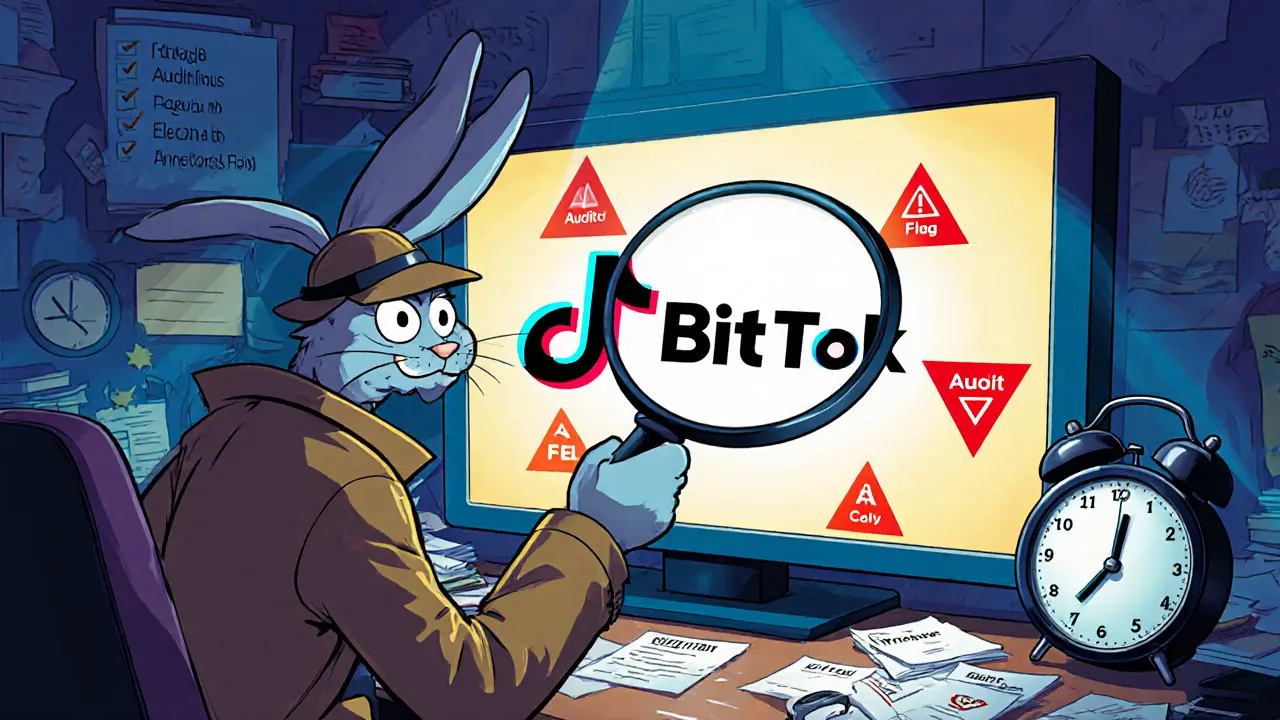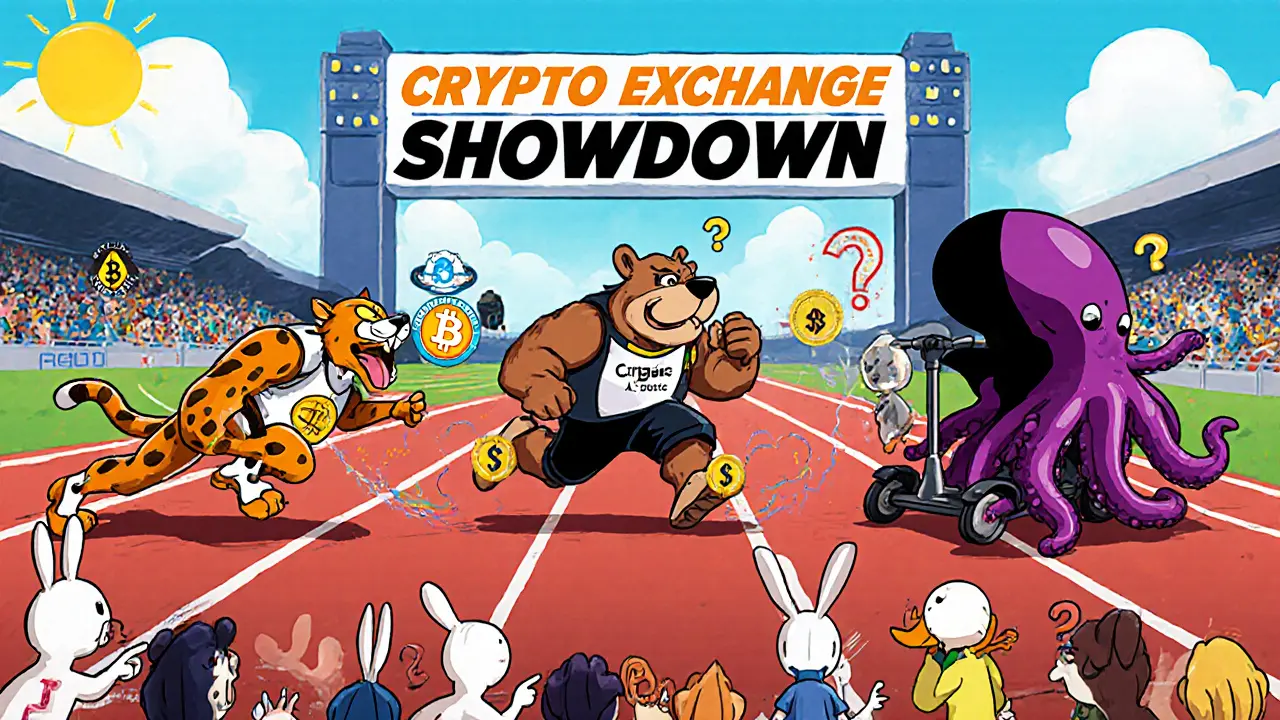
BitTok Crypto Exchange Checker
When you hear the name BitTok is a crypto exchange platform that claims to let users trade digital assets quickly and cheaply, the first question is: does it live up to the hype? The reality is that information about BitTok is scarce, making a solid BitTok review tricky. Below we peel back the layers, compare what we know with big‑name players, and give you a clear checklist to decide whether to trust BitTok with your funds.
Quick Summary
- BitTok’s public footprint is minimal - it doesn’t appear on CoinGecko, major ranking sites, or most regulatory databases.
- The only rating found is a 3.8/5 score on Trustpilot for a site called Bitok.me, and it’s unclear if that’s the same service.
- Established exchanges (Crypto.com, Binance US, Coinbase, Kraken, Gemini) disclose fees, supported assets, security audits and licensing - BitTok does not.
- Red flags include lack of transparent fee schedule, missing regulatory licences, and no verifiable trading‑volume data.
- If you’re new to crypto or value protection, stick with proven platforms until BitTok publishes clear documentation.
What Is BitTok?
BitTok markets itself as a “user‑friendly” cryptocurrency exchange, offering spot trading, a mobile app, and supposedly low fees. However, beyond a handful of vague website screenshots, there are no public whitepapers, audit reports, or licensing statements. In contrast, the industry standard is to publicise:
- Regulatory registration (e.g., FinCEN, FCA, or local crypto‑licence).
- Security certifications (SOC2, ISO27001, or third‑party audits).
- Transparent fee tables for maker/taker, withdrawal, and fiat‑on‑ramp fees.
- Daily trading‑volume and order‑book depth.
The absence of any of these items for BitTok suggests either a brand‑new launch that hasn’t built its compliance scaffolding yet, or a platform operating in the shadows.
How to Spot Red Flags in a Crypto Exchange
Before you hand over money, run through this quick checklist. It works for BitTok and any other service you might encounter:
- Regulatory presence: Search for the exchange name in the databases of the California Department of Financial Protection and Innovation or other financial regulators. No listing is a warning sign.
- Audit transparency: Legitimate platforms publish audit reports or at least link to a security firm’s findings. If you can’t locate a single document, proceed cautiously.
- Community feedback: Look for reviews on Trustpilot, Reddit, or specialized forums. A single 3.8/5 rating from 15 reviews on Trustpilot is a data point, but the lack of broader conversation (e.g., on CoinGecko) is concerning.
- Fee clarity: Hidden charges often hide in the fine print. If the site only says “low fees” without numbers, you may be paying more than you think.
- Withdrawal reliability: Check for reports of stuck withdrawals or accounts being locked after a small initial cash‑out - a classic scam pattern.

Comparing BitTok to Established Exchanges
| Exchange | Cryptocurrencies Supported | Fee Range (maker/taker) | Trustpilot Rating | Regulatory Licences |
|---|---|---|---|---|
| Crypto.com | 350+ | 0%‑0.4% | 4.2/5 (2,300 reviews) | MAS (Singapore), FCA (UK) |
| Binance US | 158 | 0%‑0.6% | 4.0/5 (1,800 reviews) | NYDFS BitLicense |
| Coinbase | 235 | 0%‑3.99% | 4.1/5 (2,100 reviews) | FINRA, FCA, MiCA (EU) |
| Kraken | 350+ | 0%‑0.4% | 4.3/5 (1,400 reviews) | FINRA, FCA, BaFin |
| Gemini | 73 | 0.5%‑3.49% | 3.9/5 (950 reviews) | NYDFS BitLicense |
| BitTok | Unknown (no public list) | Not disclosed | 3.8/5 (15 reviews on Trustpilot - may refer to Bitok.me) | Not publicly listed |
The table makes it clear: every competitor publishes concrete numbers, while BitTok leaves the fields blank. That lack of data is itself a data point.
Security & Regulatory Concerns
Security is the backbone of any exchange. Top platforms employ cold‑storage wallets for the majority of user funds, undergo regular penetration testing, and often carry insurance policies covering a portion of digital‑asset losses. None of these assurances appear on BitTok’s website.
Regulatory compliance is equally critical. The United States, European Union, and many Asian jurisdictions require crypto firms to register, implement AML/KYC programs, and submit periodic reports. A quick check of public registries (FinCEN, FCA, MAS, CDFPI) returns no record for BitTok.
If you value protection against hacks or regulatory seizures, you’ll want a platform that:
- Discloses its custodial model (e.g., 99% cold storage).
- Lists insurance coverage amounts and providers.
- Shows audit certificates from firms like CertiK or Quantstamp.
Until BitTok releases such documentation, you’re essentially operating in a black box.
User Experience & Customer Support
Ease of use can sometimes mask deeper problems, but it’s still worth looking at. User reviews that do exist describe a clean mobile UI but also mention slow ticket response times and occasional “account verification” roadblocks. By comparison, platforms like Crypto.com and Coinbase offer 24/7 live chat, phone support for premium users, and extensive help centres.
A good rule of thumb: if the only support channel is a generic email address, expect delays. Prompt, multi‑channel support is a hallmark of reputable exchanges.
Bottom Line - Should You Use BitTok?
If you’re a seasoned trader with a deep understanding of private‑key security and you can absorb a potential loss, experimenting with a small amount on BitTok might be acceptable. However, for most users-especially those new to crypto-the risks outweigh the unknown benefits.
Here’s a concise decision guide:
- New to crypto? Stick with a regulated exchange that shows clear fees, licensing, and security audits.
- Looking for the lowest fees? Crypto.com and Binance US currently offer sub‑0.5% maker‑taker rates with fee‑free crypto‑to‑crypto trades.
- Concerned about account safety? Choose a platform that stores >95% of assets offline and publishes insurance coverage.
- Want to test BitTok? Allocate no more than 1‑2% of your portfolio, use a fresh wallet, and withdraw everything after a few trades to verify withdrawal reliability.
Until BitTok provides verifiable information-fee schedule, licensing, audit reports, and transparent volume data-treat it as a high‑risk, low‑information service.

Frequently Asked Questions
Is BitTok a legitimate crypto exchange?
Legitimacy is hard to confirm because BitTok does not appear in major regulator databases, lacks public audit reports, and its fee structure is undisclosed. Without these transparency markers, the exchange should be treated as unverified.
What does the 3.8/5 Trustpilot rating refer to?
The rating belongs to a site called Bitok.me. It’s unclear whether Bitok.me is the same service as BitTok, so the rating may not reflect BitTok’s performance.
How can I verify an exchange’s regulatory status?
Search the exchange name in official registries such as FinCEN (US), FCA (UK), MAS (Singapore), or the California Department of Financial Protection and Innovation. A listed licence or registration confirms regulatory compliance.
What are typical fees on reputable exchanges?
Maker‑taker fees usually range from 0%‑0.4% on platforms like Kraken and Crypto.com. Withdrawal fees vary by asset but are clearly listed on the exchange’s fee page.
Should I keep a large amount of crypto on an exchange?
No. Even on top‑tier exchanges, best practice is to store the bulk of your holdings in a personal hardware wallet that you control. Use the exchange only for active trading.

Stefano Benny
January 19, 2025 AT 23:51Yo, the BitTok thing smells like a classic pump‑and‑dump scheme 🚀💀. The lack of KYC, audit logs and fee transparency triggers all the red‑flag sensors in any seasoned DeFi trader. Without a SOC2 audit, you’re basically handing your private keys to a black‑box. TL;DR: skip it unless you enjoy gambling with your retirement funds.
celester Johnson
January 20, 2025 AT 01:14In the grand tapestry of financial trust, BitTok stands as a ghostly apparition, a reminder that absence of evidence is not evidence of absence. Its opaque veil invites the worst of human nature, feeding the hive‑mind paranoia that plagues crypto. One could argue that trusting such a platform is an ethical violation, a surrender of agency to unseen custodians.
Prince Chaudhary
January 20, 2025 AT 03:28Hey folks, before you dive into any exchange, run the checklist the article gave.
Verify regulatory registration, audit reports, and fee tables.
If any of those are missing, treat the platform like a sandbox – only test with amounts you can afford to lose.
Keep your main holdings in a hardware wallet and use the exchange just for short‑term swaps.
You’ve got this!
John Kinh
January 20, 2025 AT 06:48Honestly, I could write a 10‑page essay, but why bother?
BitTok looks like a copy‑paste of every other sketchy site out there 😑.
Mark Camden
January 20, 2025 AT 10:58Your moral compass is clearly misaligned when you champion a platform with no transparency.
Evie View
January 20, 2025 AT 16:31The moment you mention BitTok I feel a chill, because it reeks of desperation and opportunistic fraud that preys on naïve investors.
Kate Roberge
January 20, 2025 AT 23:28Look, the only thing BitTok is good at is collecting gullible newbies and disappearing faster than your Wi‑Fi during a storm.
Ben Dwyer
January 21, 2025 AT 07:48If you decide to test the waters, set a strict stop‑loss and withdraw immediately after confirming the withdrawal process works as advertised.
Waynne Kilian
January 21, 2025 AT 17:31I rekn that we should keep an open mind, but also remember that a platform without verifiable data is like a ship sailing without a compass.
Michael Wilkinson
January 22, 2025 AT 04:38When you examine BitTok under the same microscope you would apply to any regulated exchange, the cracks become glaringly obvious. First, the absence of any registration with FinCEN, FCA, or MAS means the platform operates in a legal gray zone that can be shut down without notice, leaving users stranded. Second, the claim of “low fees” is unsubstantiated; without a published fee schedule users cannot calculate their true cost of entry, which is a classic hallmark of predatory services. Third, the lack of publicly available audit reports or third‑party security certifications suggests that the code and custodial practices have never been vetted by independent experts. Fourth, the community feedback is practically nonexistent, with only a dubious 3.8‑star rating that may refer to a different entity entirely, indicating a lack of real user experience. Fifth, the withdrawal process has no documented success stories, and the article even mentions the inability to verify withdrawals, which should set off an immediate alarm for anyone concerned about liquidity risk. Sixth, the platform’s UI may look slick, but a slick UI cannot compensate for missing compliance, and it often serves as a veneer to distract from underlying vulnerabilities. Seventh, the absence of insurance coverage disclosures means that any loss due to hack or insolvency would be borne entirely by the users, violating best‑practice risk‑management principles. Eighth, the exchange does not publish its custodial model-whether it holds assets in cold storage or hot wallets-so users have no idea how exposed their funds are to theft. Ninth, the KYC/AML procedures are either vague or missing, opening the door for illicit activity and future regulatory crackdowns. Tenth, many reputable exchanges publish their daily trading volume, which provides transparency about market depth; BitTok offers no such data, making it impossible to assess liquidity. Eleventh, the customer support appears limited to generic email addresses, which is a red flag for users needing rapid assistance. Twelfth, the platform’s lack of a clear roadmap or development updates suggests stagnation rather than growth. Thirteenth, the governance model is undefined; there is no information about the team, advisors, or institutional backers. Fourteenth, the tokenomics, if any, are never disclosed, leaving investors unaware of potential dilution or hidden fees. And finally, in an ecosystem where trust is earned through verifiable actions, BitTok has provided none, making it a high‑risk, low‑information service that should be avoided by anyone with even a modicum of financial prudence.
Clint Barnett
January 22, 2025 AT 17:08Alright, let’s break this down with some color.
First off, transparency isn’t a luxury-it’s the baseline for any exchange that wants to survive the wild west of crypto.
If you can’t see the fee schedule, you’re basically flying blind, and blind pilots crash.
Second, regulatory licenses act like a passport; without them you’re a stateless entity that can be shut down on a whim.
Third, security audits are the oil change of the software world-skip them and you’ll end up with burnt engines.
Fourth, community feedback is the compass that guides new users; a single ambiguous rating is not enough to chart a course.
Fifth, always keep the bulk of your assets off‑exchange; think of the exchange as a temporary parking lot, not a garage.
In short, treat BitTok like a test drive: brief, cautious, and always ready to step out.
Jacob Anderson
January 23, 2025 AT 07:01Oh sure, because every exchange that makes a profit must also hand out free hugs and sunshine, right?
Kate Nicholls
January 23, 2025 AT 22:18I appreciate the thoroughness, but even a well‑written checklist can’t compensate for missing core documentation.
Carl Robertson
January 24, 2025 AT 14:58The shadows of BitTok loom over the crypto horizon like an ominous storm, and every trader feels the tremor of uncertainty. It’s as if the platform whispers promises while hiding knives behind its smile.
Rajini N
January 25, 2025 AT 09:01Let’s stay grounded-focus on verifiable data and keep emotions in check; that’s the safest path through any storm.
Sidharth Praveen
January 26, 2025 AT 04:28Keep your eyes on the prize, test cautiously and you’ll navigate any risk like a pro.
Sophie Sturdevant
January 27, 2025 AT 01:18If you’re still entertaining BitTok, you’re ignoring the red‑flag matrix and exposing your portfolio to unquantified counterparty risk.
Nathan Blades
January 27, 2025 AT 23:31Think of every exchange as a philosophical experiment: you weigh trust against utility, and with BitTok the scales tip heavily toward doubt. Yet some still chase the thrill, hoping the unknown will reward them.
Jan B.
January 28, 2025 AT 23:08Sounds risky. Stick to regulated platforms.
MARLIN RIVERA
January 30, 2025 AT 00:08The data void surrounding BitTok is not a mystery; it’s a deliberate obfuscation that screams amateurish fraud.
Debby Haime
January 31, 2025 AT 02:31Remember, you control your assets-don’t let a sketchy platform dictate your financial destiny.
emmanuel omari
February 1, 2025 AT 06:18In my country we demand full licensing, and any service that skirts regulations should be banned outright.
Andy Cox
February 2, 2025 AT 11:28Just watching the drama unfold, hoping the market self‑corrects.